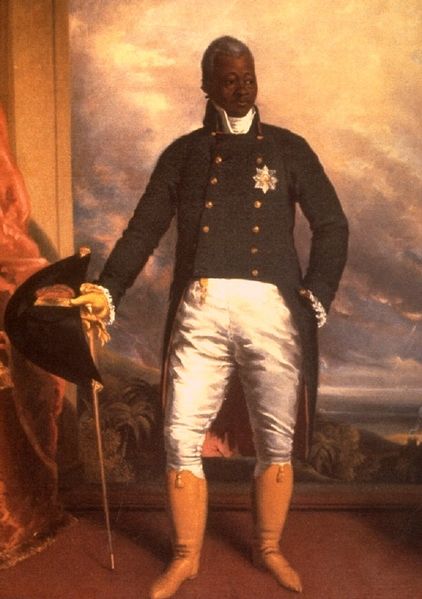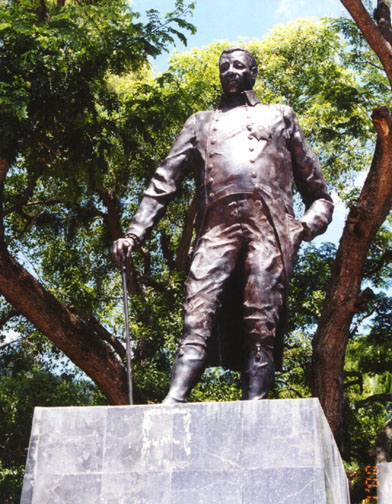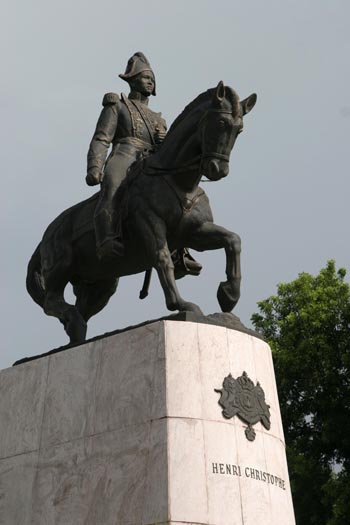<Back to Index>
- Mathematician Sergei Lvovich Sobolev, 1908
- Sculptor Adolf von Hildebrand, 1847
- President of the State of Haiti Henri Christophe, 1767
PAGE SPONSOR



Henri Christophe (who chose for himself an anglicized name Henry Christopher) (6 October 1767 – 8 October 1820) was a key leader in the Haitian Revolution, winning independence from France in 1804. On 17 February 1807, after the creation of a separate nation in the north, Christophe was elected President of the State of Haiti. On 26 March 1811, he was proclaimed Henry I, King of Haïti. He is also known for constructing the Citadelle Laferrière.
Born Christopher Henry probably in Grenada, the son of Christophe, a freeman, Christophe was brought to Saint Domingue as a slave in the northern region. In 1779 he may have served with the French Forces as a drummer boy in the American Revolution in the Chasseurs - Volontaires de Saint-Dominigue, a regiment composed of gens de couleur. They fought at the Siege of Savannah.
As an adult, Christophe worked as a mason, sailor, stable hand, waiter, and billiard maker. He worked in and managed a hotel restaurant in Cap-Français, the capital of the French colony of Saint-Domingue, where he became skilled at dealing with the grand blancs, as the wealthy white French planters were called. Such political skills also served him well when he became an officer in the military and leader in the country. He was said to have obtained his freedom as a young man, before the Slave Uprising of 1791. Sometime after he had settled in Haiti he brought his sister Marie there, where she married and had issue.
Beginning with the slave uprising of 1791, Christophe distinguished himself in the Haïtian Revolution and quickly rose to be an officer. He fought for years with Toussaint Louverture in
the north, helping defeat the French, the Spanish, British, and finally
French national troops. By 1802 he was a general under Toussaint
Louverture. After the French deported Toussaint Louverture to France, and fighting continued under Rochambeau, Jean Jacques Dessalines recognized they wanted to reenslave the blacks. He led the fight to defeat French
forces. As leader, Dessalines declared Saint - Domingue's independence
and the new name of Haiti in 1804. In
1806 Christophe was aware of a plot to kill Dessalines; seeing an
opportunity to seize power for himself, he did not warn the
self - proclaimed Emperor. The plot was said to involve Alexandre Pétion, a competing "gens de couleur";
as a half-white, Pétion held a weak position among the majority
of black leaders and population and possibly viewed assassination as
the surest way of removing Dessalines. However, this allegation has not
been proven; other sources clear Pétion's name from the plot and
say that he has been tied to it only on the basis of such conjectures.
In any case, Dessalines was assassinated, and Christophe was elected to
the newly created position of president, but without real powers. Feeling
insulted, Christophe retreated with his followers to the Plaine du Nord
and created a separate government there. Christophe had suspected that
he would be next to be assassinated. In 1807 Christophe declared himself président et généralissime des forces de terre et de mer de l'État d'Haïti (English: President and Generalissimo of the armies of land and sea of the State of Haïti). Pétion
became President of the "Republic of Haïti" in the south backed by
General Boyer who had control of the southern armies. In 1811 Henry made the northern state of Haïti a kingdom, and was ordained King by Arch Bishop of Milot Corneil Breuil. The edict of 1 April 1811 gave his full title as Henri,
par la grâce de Dieu et la Loi constitutionelle de l'État
Roi d'Haïti, Souverain des Îles de la Tortue, Gonâve,
et autres îles adjacentes, Destructeur de la tyrannie,
Régénérateur et bienfaiteur de la nation
haïtienne, Créateur de ses institutiones morales,
politiques et guerrières, Premier monarque couronné du
Nouveau-Monde, Défenseur de la foi, Fondateur de l'ordre royal
et militaire de Saint-Henri. Henry, by the grace of God and constitutional law of the state, King of Haiti, Sovereign of Tortuga, Gonâve,
and other adjacent islands, Destroyer of tyranny, Regenerator and
Benefactor of the Haïtian nation, Creator of her moral, political,
and martial institutions, First crowned monarch of the New World, Defender of the faith, Founder of the Royal Military Order of Saint Henry. He renamed Cap Français Cap-Henri. It is now called Cap-Haïtien. Christophe named his legitimate son, Jacques-Victor Henry, heir apparent with the title Prince Royal of Haïti. Even in documents written in French, the king's name was usually given an English spelling. He had another son who was a colonel in his army. Christophe built for his own use six châteaux, eight palaces and the massive Citadelle Laferrière,
still considered one of the wonders of the era. Nine years later, at
the end of his monarchy, he had increased the number of designated
nobility from the original 87 to 134. Politically,
in the North, Christophe was caught between reinforcing a version of
the slave plantation system in an attempt to increase agricultural
production, or handing out the plantation land for peasant cultivation
(the approach taken by Alexandre Petion in the South). King Henry took the route of enforcing corvee plantation
work on the population in lieu of taxes alongside his massive building
projects. As a result, Northern Haiti during his reign was despotic but
relatively wealthy. He preferred trading with English merchants and
American merchants than both French and Spanish merchants which did not
recognize Haiti as independent country, he ordered that extra Africans
be brought to Haiti to work on his vast projects instead of being
traded to other Caribbean countries where they would be held as slaves.
As a result, numerous Africans who were originally brought by the
French as slaves came to Haiti. He made an agreement with Britain that
Haiti would not be a threat to their Caribbean colonies in return for
the British Navy warning the Kingdom of Haiti of any imminent attack
from French troops. In 1807 the British Parliament passed the Slave
Trade of 1807 which did not outlaw slavery, but abolished the
importation of African slaves to British territory. Because of this
increased bilateral trade, he had gathered an enormous sum of British
pounds in his treasury. By contrast, Petion's Southern Haiti became
much poorer because the land-share destroyed agricultural productivity. One
of Christophe's first acts as king was to create a Haïtian
Peerage, with four princes, seven dukes, 22 counts, 40 barons and 14 chevaliers. Christophe also founded a College of Arms to provide armorial bearings to the newly ennobled. Christophe's kingship was modelled in part on the enlightened absolutism of Frederick the Great. Thomas Clarkson,
the English slave abolitionist, held a long written correspondence with
Christophe which gives insights into his philosophy and style of
government. The king sought an education for his
children along the lines of the princelings of Enlightenment Europe. Despite his efforts to promote education and establish a legal system called the Code Henry, King Henri was an unpopular autocratic monarch. In addition, his realm was constantly challenged by that of the South, which was ruled by gens de couleur.
Toward the end of Christophe's reign, public sentiment was sharply
against what many perceived to be his feudal policies, which he intended to develop in the country. Ill and infirm at age fifty-three, King Henry shot himself with a silver bullet rather than face the possibility of a coup. He was buried within the Citadelle Laferriere. Pierre Nord Alexis, President of Haiti from 1902 – 1908, was Christophe's grandson. Michèle Bennett Duvalier, First Lady of Haiti from 1980 to 1986, was Christophe's great-great-great-granddaughter.